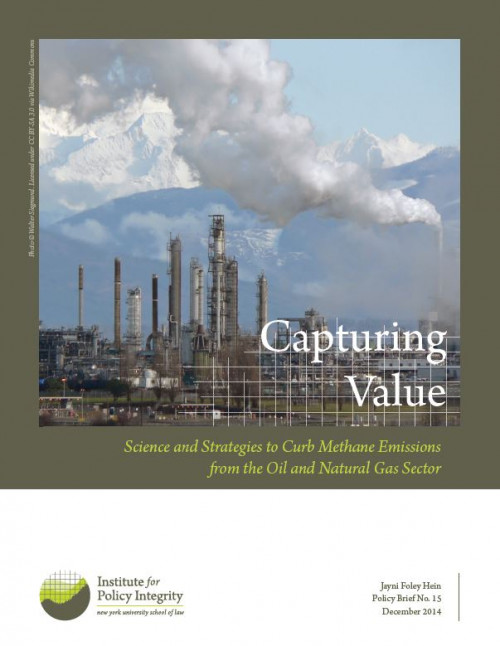-
Comments on New Offshore Leasing Plan
Policy Integrity recently filed public comments on the Bureau of Ocean Energy Management’s (BOEM’s) new offshore leasing proposal, suggesting that the agency update its use of “option value” to improve its valuation of offshore resources.
-
Court Rules on Offshore Leasing Lawsuit
Policy Integrity senior advisor Michael Livermore represented the plaintiff in Center for Sustainable Economy v. Jewell, a lawsuit challenging the Bureau of Ocean Energy Management’s (BOEM’s) 2012-2017 leasing plan for the Gulf of Mexico and the Alaskan coast. The Center for Sustainable Economy (CSE) argued that incomplete and flawed economic analysis leads the government to sell resource leases too quickly and too cheaply, potentially costing the American public billions of dollars and leading to high-risk drilling. Today, the U.S. Court of Appeals for the D.C. Circuit ruled against CSE in the case. However, part of the ruling could lead to major changes in how the government values the natural resources it leases.
-
Supreme Court Brief for Mercury and Air Toxics Standards Case
The Supreme Court will soon hear a challenge to the EPA’s Mercury and Air Toxics Standards (commonly known as the MATS rule). Policy Integrity has submitted an amicus brief in support of the EPA for this case.
-
Policy Integrity Files Brief in Case Challenging EPA’s Clean Power Plan
The U.S. Court of Appeals for the D.C. Circuit will soon hear the first set of cases challenging President Obama’s signature climate change initiative—the EPA’s Clean Power Plan. We recently filed an amicus brief for West Virginia v. EPA, one of the cases challenging the as-yet unfinalized regulation.
-
Victory at Sea: New Offshore Leasing Program Begins to Adopt Policy Integrity Recommendations
Policy Integrity’s multi-year effort to make the government account for “option value” in its natural resource leasing decisions has begun to pay off. In its new proposal for offshore oil and gas leasing from 2017-2022, the Department of the Interior’s Bureau of Ocean Energy Management (BOEM) devotes 12 pages to option value and related resource valuation concepts, which will now be considered in leasing decisions. Much of this language closely resembles the arguments Policy Integrity has made to the agency repeatedly since 2009.
-
Energy Conservation Standards - Public Comments
Policy Integrity has submitted comments to the Department of Energy, encouraging DOE to improve its economic justification for a proposed energy efficiency determination. DOE has determined that energy conservation standards for mercury vapor and metal halide high-intensity discharge lamps are not “economically justified” as required by statute, even though such standards could save up to 1.6 quadrillion British thermal units of energy. By reducing electricity demand at and pollution from fossil fuel-fired power plants, such energy savings would generate environmental and health benefits. However, at no point in DOE’s documentation does the agency discuss environmental and health benefits as part of its analysis of “economic justification” and “national impact.”
-

Capturing Value
Science and Strategies to Curb Methane Emissions from the Oil and Natural Gas Sector
Methane, the primary component of natural gas, is a potent climate pollutant up to 86 times more powerful than carbon dioxide on a 20-year timeframe. Currently the United States loses at least 1 to 3 percent of its total natural gas production each year when methane is leaked or vented to the atmosphere. Federal regulations could reduce methane emissions by up to 50 percent at little or no net cost, using available technologies.
-
Policy Integrity Helps Reform Federal Rulemaking Petition Process
Individuals have the right to petition federal agencies to issue, amend, or repeal regulations, but agencies lack a uniform process for handling these petitions. Policy Integrity recently worked with the Administrative Conference of the United States (ACUS), an independent federal agency dedicated to improving the administrative process, to create new guidelines for the petition process. In early December, ACUS adopted new recommendations for federal agencies, based on Policy Integrity’s research and suggestions.
-

Interest Groups and Environmental Policy
Inconsistent Positions and Missed Opportunities
This Essay examines and explains the positions of the principal interest groups over the past four decades with respect to the two central questions of environmental policy: the appropriate policy goal and the instrument that should be used to carry out the policy. While environmental groups and industry have largely switched positions on the two central questions of environmental policy, the points at which their positions overlapped were fleeting, and opportunities to make substantial progress in rationalizing the system of environmental regulation have largely been unrealized.
-
EPA’s Clean Power Plan - Public Comments
In Policy Integrity’s recently submitted public comments on the EPA’s Clean Power Plan, we make the case that the EPA’s flexible, cost-minimizing approach to setting performance standards for existing power plants is consistent with over 30 years of EPA Clean Air Act practice, under both Republican and Democratic administrations. While opponents of the Clean Power Plan have argued that the EPA is taking unprecedented and unwarranted steps to regulate carbon dioxide under the Clean Air Act, we show that the plan is deeply rooted in precedent.
